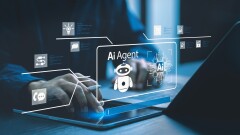Small businesses are looking to artificial intelligence for a competitive edge; the agentic future of customer service and support; CEOs have mixed results with AI and cybersecurity; upgrades to Microsoft Teams; and other developments in technology this past month and how they'll impact your clients and your firm.
1. Small businesses look to AI for competitive edge

Why this is important for your firm and clients: I agree that AI is a game-changer and that it will have a big impact on small businesses. But I don't believe it's having that impact yet. Sure, some businesses are dabbling with generative AI chatbots like ChatGPT, Gemini and CoPilot, but these tools are still hallucinating (i.e., making errors) too much to be relied upon for any serious decision-making.
2. AI means Amazon can cut white-collar workers, CEO says

Why this is important for your firm and clients: Everybody needs to take a breath. Knowing how unreliable, inaccurate, and error-prone today's AI tools are, I don't see this technology replacing people right away. But … it's going to happen, and likely more so in the next two to five years. If you're an employee of a big company take to heart Jassy's advice: Become expert with these tools so that you can become valuable, productive and profitable to your employer. If you're a small-business owner the same applies.
3. LinkedIn CEO says AI writing assistant not as popular as expected

Why this is important for your firm and clients: Here's a tip: When posting your thoughts on LinkedIn, don't use their AI tools. Why? Because it's your thoughts, not a bot. LinkedIn is excellent because people can be their (professional) selves on the platforms, sharing advice and insights. I believe that AI takes something away from that and — thank goodness — we humans can detect it. Go ahead and use the tools to make resumes or job listings better. But your thoughts are your thoughts and should always be 100% you.
4. Agentic AI to handle 68% of customer service/support by 2028

Why this is important for your firm and clients: This seems right to me. For the next two to three years, we'll be seeing every tech company rolling out agents and agentic features to perform mundane and repetitive tasks currently taking up the time of our employees. Initially, these features aren't going to work very well. A few intrepid souls will dive in, but hopefully they won't be using these tools for any core undertakings. But by 2028? That's almost three years away — a lifetime in the AI world. And given the advancements we've seen in just the past couple of years, I have confidence that these agents will be working better and more reliably than our own employees.
5. A cautionary tale about cyber threats and employee handbooks

Why this is important for your firm and clients: Wow. Say what you want about hackers but that's pretty ingenious. As the article points out, it's important to train employees on email security using this scam as a case study; clarify how handbooks are distributed and acknowledged; strengthen IT defenses with multifactor authentication and anti-malware tools; and ensure HR portals and third-party vendors follow strong security protocols. It's a sharp reminder that even routine HR documents can be weaponized in sophisticated phishing attacks.
6. Apple AI announcements disappoint

Why this is important for your firm and clients: Two takes: First, the company is reinforcing its main product lines. In its official update, the company said it is rolling out
Second — patience. Unlike some of its other big tech competitors, Apple is more hesitant releasing products based on technologies that still aren't working as they've been hyped. By this I mean AI. This is a company built on innovation, quality and reliability. So the company is going slower down this road and only releasing new features when they are reliable enough to use. Does this mean that they're behind in the AI "race?" Considering how long this race still has to go, I don't think so at all.
7. Teams update enhances productivity, customization

Why this is important for your firm and clients: As Teams grows in popularity, more users within organizations need better control over their access, collaboration and data sharing. They also want a more individualized experience. These updates are a big step in that direction. If your company is using Teams, my advice is to make sure it's the latest build and to also pay for a little training from a Microsoft consultant so that your users are fully taking advantage of this application.
8. HubSpot launches CRM connector with ChatGPT

Why this is important for your firm and clients: This is really a game-changer for CRM applications. And there will be more of this. But think of it: Rather than building your own internal model, you simply connect a chatbot like ChatGPT to your CRM system and then train it on your data. This way your sales and service teams can not only ask questions about customers, prospects and other CRM activities but ultimately launch agents to perform tasks automatically based on these queries. My expectation is that most mainstream CRM vendors will partner with the major chatbot providers to offer similar functionality in the near future.
9. Instagram CEO almost fell for new Google scam

Why this is important for your firm and clients: This is not just some guy who almost got duped. It's the CEO of Instagram, who I'm assuming is well-versed in the technology space. The warning is that if a senior technology executive — a person who lives in this space — can almost be fooled by an online scam, what does that mean for the rest of us? It means stepping up our IT security budgets, investing in training sessions and software and making sure our internal security software is updated and monitored.
10. Shopify's new AI tools empower merchants

Why this is important for your firm and clients: According to the company key features include the AI-Powered Store Builder, which lets merchants enter a few descriptive keywords, and Shopify will generate three layout options with images and text, significantly reducing setup time; a new modular theme foundation that allows merchants to use drag-and-drop "theme blocks;" and the Sidekick AI Assistant, which is now capable of multistep analysis, helping merchants diagnose sales trends, re-engage customers, and navigate admin tasks via voice chat and screen sharing.





